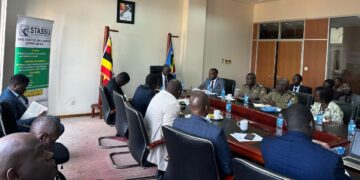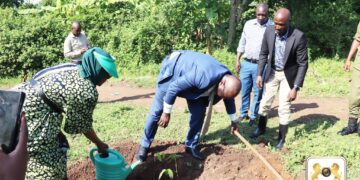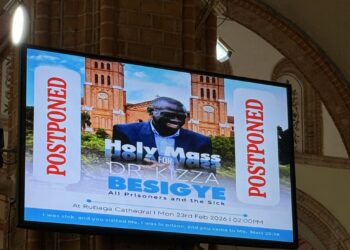By Eliab Tukamushaba,
NATIONAL
Hon. Okello Oryem, the minister for foreign affairs had showered praises to AMBROSOLI Consult for organising weekly think tank discussions.
This was during a discussion which was chaired by Mr Kugonza Geoffrey, the great city businessman at Serena Hotel, Kampala on Wednesday
• AMBROSOLI think tank discussions started last year aimed at discussing critical issues affecting society and the team focuses on developing critical thinkers in the world.
Hon Oryem stated that this think tank is likely to be the first in this country. He later pledged to support the team and its activities.

The minister was happy to pass by Dr. Charles Barugahare, former University Secretary Makerere University, presentation on handling finances in these economic hard times which moved many members who acknowledged and applauded the presentation as the best on financial literacy.
This presentation largely covered on personal finaces (managing the money that comes in or gets out of one’s pocket) which involve two elements: inflows and outflows or income and expenditure.
The presentation covered four personal financial aspects which are explained as follows;
- Understanding personal income or inflows.
This is majorly about looking at how personal income is earned and received. There are several sources of personal income namely: salary/wage, allowances, rental, commission, interest, selling something you create or own, investments, gifts, pocket money, tips, agriculture.
Accordingly, the majority of employees have one major source of income (salary). Due to do different causes, circumstances under which we operate have significantly changed. This includes use of technology to do some of the work, Covid 19 effects, closure or scaling down of businesses, restructuring, retrenchment, ceasing a political office, increasing cost of living, among many other causes.
Therefore, if you a person have one source of income, he is very close to hard economic times should these circumstances occur.
He explained hard economic times as difficulty to live within the financial means at your disposal.
Thus, understanding where and how a person’s money comes in, the frequency, the risks affecting his inflows and the diversity of your income sources is very vital.
- Understanding personal expenditure or outflows
According to this aspect, expenditure looks at how the money earned is used, spent or gets out of one’s pocket.
Dr. Charles in his presentation used a funnel to describe how we spend.
The funnel has many uses but one of the main ones is to control the rate at which things come in and get out.
It is wide at the top because it is presumed that what is coming in is in bulk and thus, there is need to control, regulate, monitor and check how it gets out.
This principle applies to our lives as well. Unfortunately, most of the funnels for our personal finances are upside down with few sources and quantity of income coming in and many diversified expenditures.
The expenses can be as many and diverse as possible. In Uganda, this situation is worsened by the population structure, for instance for the year 2022, the population is as follows: 0-14 years is 48.5%, 15-24 years is 21.2%, 25-64 Years is 28.3% and 65 years or older is 2%.
This explains that the people who are working and earning income in Uganda are largely in the age bracket of 25-64 years, which is only 28.3% of the population. This straight away puts a strain on the working people.
Thus, this calls for deeper analysis and strategy to either find more sources and quality of income or manage our expenditures or do both at the same time.
- Preparing for hard financial times.
This is one of the challenging aspects, however, there are two aspects to it, that is, managing the income and managing expenditure. To do this, it is imperative that we categorise and understand the three crucial expenditure elements which includes, Basic needs, safety needs and desired needs.
Dr. Charles stresses that we all have three choices available to us: either to increase our income or control expenditures or do both co-currently.
The best practice guidance is that basic needs should be within (50-70) % of your net income, safety needs in the range of (10-20) % and desired needs taking (10-30) % depending on individual circumstances, ambition and risk tolerance levels.
Dr Charles recommends the following strategies if what a person earnings are no longer there;
- Firstly, Liberating yourself as no body else will do it for you – setting your own financial standards taking into account basic needs, safety needs and desired needs, best practice can guide but you are fully in charge of your personal finances. The worst standard is to follow other people with no clear focus of your own. Because, when they move very fast, you may not manage to follow them or when they stop, will you also stop or what happens? Therefore, you have to plan to run your own race. This means you understand: what basics, safety and desires mean to you and work on them.
- Secondly, knowledge and skills – seek financial awareness and knowledge on an-going basis. Building your financial knowledge muscle as it enhances control over your finances and facilitates you to freely make better financial choices other factors remaining constant.
- Lastly, exposing yourself to real-life realities by learning and sharing from both the good and bad experiences from those who have seen it, faced it and got out of it or fell stack there.
- Dealing with hard times when you are already in it.
When you are in hard economic times, it means you are having difficulty living within your financial means.
These are some of the things a person can do:
- Quickly acknowledge the financial reality you are facing and accept it. Do not live in denial.
- Revisit the three categories of needs: basic, safety and desired needs. Re-prioritise them more into basic and safety needs first. Condition yourself to operate within them. Be open and more willing to take hard choices and options. You may have to sacrifice the desired needs like disposing off your luxurious car and other key expenditure areas. This decision will allow you to reorganise yourself.
- Seek guidance from those who experienced similar or related challenges, remember, experience is the best teacher.
- Pay attention to survival first – shape up and adjust quickly and begin to work on possible solutions.
Dr Charles stresses that if expenses consistently exceed a person’s income, he will be exposed to hard financial times in the long-run. Acknowledge the situation and straight away revisit the categories of your priorities in three: basic, safety and desired needs in to live in your own standards.







































